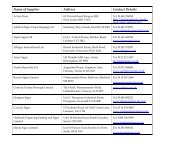titlepage/contents pg 1-16 - British Parking Association
titlepage/contents pg 1-16 - British Parking Association
titlepage/contents pg 1-16 - British Parking Association
You also want an ePaper? Increase the reach of your titles
YUMPU automatically turns print PDFs into web optimized ePapers that Google loves.
118 Chapter 7● Residents;● Visitors;● Business people;● People with a mobilitydisability; and● Doctors or other healthworkers.All such permits grant a privilegethat is not available to othermotorists. As such they create avaluable asset that can bevulnerable to abuse. Forexample, in central Londonfraudulent resident permits willattract a particularly highpremium as they confer a 90%reduction on the normal chargeof £5 per day to drive in the areaimposed by the Londoncongestion charging scheme.Permits should, therefore, beintroduced or supported onlywhen there is sound evidencethat an important policy objectiveis served by providing suchprivilege. Control of their issueand their enforcement is anessential part of the propermanagement of permit schemes.Providing for on-streetloadingIn order to ensure that loading isproperly catered for it will benecessary to establish, throughsurveys and interviews:●●The premises requiring onstreetloading facilities;The duration and frequencyof loading activity; and● The size and nature of thegoods being loaded.Where the speed or volume oftraffic is likely to make loadingactivity hazardous, speed ortraffic management measures toreduce the source of conflictshould be considered.When setting the times forloading restrictions, care shouldbe given to consider the needs ofbusinesses. If possible therestrictions should apply at thesame times as for parkingrestrictions. There may bespecific local circumstances,however, that demand a flexibleapproach. This will need to beconsidered as part of theconsultation with businessesalong the route and the prospectof introducing innovativesolutions should be explored.In entertainment districts, whererestaurants and bars are openuntil the early hours, it may beappropriate to permit loadingduring the morning, and restrict itfrom lunchtime until late at night,when the streets are busier. Thiswould mean that restaurants,where the staff finish work in theearly hours of the morning, couldreceive deliveries towardsmidday, as they are opening forlunch, rather than have to rosterstaff to receive deliveries early inthe morning.During planning of the Red Routenetwork in London, it was initiallythought desirable to standardise thetimes of restrictions as 7am to 7pm,which was the norm for bus lanes.However this would require theproprietors of lock-up shops to bepresent well before 7am to receivedeliveries, and this would be a dailyproblem for those premises receivingfresh foods. Where traffic surveysshowed that there would not beproblems for free flow of traffic,particularly buses, the start of therestrictions was delayed until 08.00hours.In streets where loading on bothsides of the road would restricttraffic, such as by making itdifficult for two buses to pass, itcan be useful to permit loadingon one side of the road until 1pmand on the other side after that.This means that loading vehiclescan stop somewhere in the streetat any time, but congestion isavoided. If a business hasdeliveries that would be difficultto carry across the road, theycan arrange with their suppliersfor a morning or afternoondelivery to suit the permittedhours on their side of the road.Traffic orders for loadingrestrictions should normally limittime for loading to twentyminutes. There is merit inmaintaining this, as a consistentrequirement across the countryas it is well understood bydelivery firms and the time limit isnot normally signed. Wherethere is a particular need forlonger unloading periods, such







